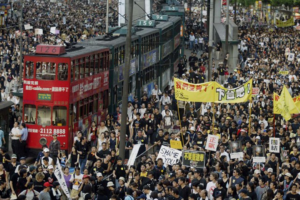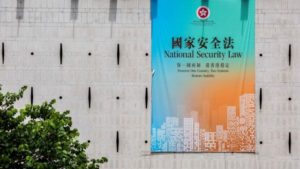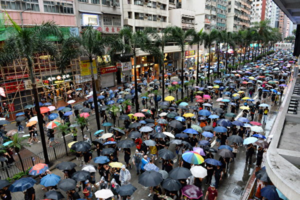Widgetized Section
Go to Admin » Appearance » Widgets » and move Gabfire Widget: Social into that MastheadOverlay zone
The dissolution of Civil Human Right Front Ending 19 years of history
The Civil Human Rights Front, which hosted the July 1 anti-government demonstrations in Hong Kong for many years, has disbanded after 19 years. After the Hong Kong Education Professionals Association, it became another pan-democratic organization in Hong Kong that ended in response to the Hongkong National Security.
In a statement released on 15, the CHRF said it had unanimously decided to dissolution its secretariat on Friday (13) because its convenor, Chen Hao-hwan, had been jailed, its secretariat could no longer function, and no members were willing to participate in the work of the next secretariat. It thanked the people of Hong Kong for standing shoulder to shoulder with the group.
China’s Hong Kong and Macao Affairs Office of the State Council accused the CHRF of disbanding as a “delusional” attempt to “escape” and said it “must be investigated and severely punished in accordance with the law”. Hong Kong police said they were “actively” investigating CHRF.
“For more than a year, the government has repeatedly rejected applications from CHRF and various groups to march on the grounds of the epidemic, and member groups have been subjected to repression. Civil society has faced unprecedented challenges,” the CHRF statement said. The GROUP had hoped to continue to confront the challenges in the same way. However, with convenor Chen Haohuan in jail due to many cases, the secretariat could no longer maintain its operation. Without the participation of its members in the next secretariat, it had no alternative but to announce its dissolution.”
Anti-national security legislation CHRF formed
To mark the fifth anniversary of Hong Kong’s handover in 2002, the first chief executive Tung Chee-hwa re-election, the then Chinese vice premier Qian Qichen had an interview with Hong Kong media on June, he said, Hong Kong should implement the basic law stipulated in article 23 of the reversal of the national security legislation, the SAR government in September the same year issued a consultation document, the national security legislation became hot discussion. At this time, Dr. Lucy Hu, director general of the Hong Kong Christian Institute, launched a civil human Rights Front to express opposition to the “23 legislation”.
In February 2003, the National Security Bill was formally promulgated and introduced into the Legislative Council for deliberation. The Democratic camp considered the bill vague and harsh and that it would seriously infringe on civil liberties. In March, SARS broke out in Hong Kong and 299 people died. After the outbreak ended in June, discussions on the “23 legislation” resumed, and CHRF announced a march against the legislation on July 1.
On July 1, 2003, half a million people responded to CHRF’s call to march against the “Article 23” national security legislation, and CHRF has since become a cross-party platform for bringing together Hong Kong’s democracy camp.
In 2004, the CHRF held another July 1 March, with the number of participants increasing to 530,000, according to CHRF, and 200,000 according to the police. Mr Tung resigned in March 2005, failing to complete his second term. He was later appointed vice chairman of the National Committee of the Chinese People’s Political Consultative Conference.
Since then, the July 1 March of CHRF and the June 4 candlelight vigil of the Hongkong Alliance have been combined as two major events in Hong Kong’s political calendar. The march has evolved from a single issue protest into a “melting pot” where different pressure groups express their different demands to the government. In addition to fighting for universal suffrage for the election of the Chief executive and the Legislative Council, Labor rights, disadvantaged groups, freedom of the press, sexual minority groups, falun Gong, etc.
On the eve of July 1, 2020, the Standing Committee of the National People’s Congress (NPC) passed the Law on National Security in Hong Kong and submitted it to the HKSAR for promulgation and implementation. In late July, Hong Kong Chief Executive Carrie Lam announced that the legislative council elections scheduled for September would be postponed due to COVID-19, citing emergency laws. Mr Chan took over as convenor of CHRF in October. Mr Shun tze Keat was one of 47 defendants charged with “conspiracy to subvert state power” under the National Security Act in January 2021 in connection with the Democratic Party’s primary election case for the Legislative Council.
The reason of why CHRF dissolution
Trigger the proximate cause of the CHRF dissolution can be traced back to March 5, Singapore’s lianhe zaobao quoted unnamed sources, said after the national democratic foundation (NED) circulated on the Internet has backed against revisionism cases at CHRF, Hong Kong authorities are investigating the matter, once confirmed, CHRF will due to violation of the Hong Kong national security act by the SAR government crackdown.
Said on April 26, Chen Haohuan received file, director of the Hong Kong police force community affairs, accused of CHRF violation of the societies ordinance, require CHRF six information provided on the 5 May, or explain, Chen Haohuan reply to the police, emphasized according to the basic law of Hong Kong residents shall enjoy freedom of association, and bilateral disagreed with the societies ordinance, introduced by the PLC It does not consider CHRF to be illegal.
The registration requirements of the Societies Ordinance were repealed by the British Hong Kong Legislative Council in 1992, but the Standing Committee of the National People’s Congress ruled in February 1997 that the societies Ordinance contravenes the Basic Law and will not be adopted into the law of the Hksar after the transfer of sovereignty on 1 July. The Provisional Legislative Council of the HKSAR, then operating in Shenzhen, Guangdong province, passed an amendment in June reverting the Societies Ordinance to its pre-1992 version, effective from the establishment of the HKSAR.
On May 28, Tan was sentenced to 18 months in prison for admitting to organizing and participating in unsanctioned rallies for China’s National Day on October 1, 2019. The CHRF secretariat was immediately jailed, leaving the CHRF secretariat empty. Chung Song Hui, a veteran bus union leader who had been a convener of MINFRU twice, acted as temporary convenor. In late June, Chung confirmed to the Hong Kong media that the CHRF no longer applied to hold the July 1 March as it was no longer administratively feasible.
The outside reaction
Sunday after CHRF dissolved by the Hong Kong police force said in a statement: “the police in April this year was according to article 15 the societies ordinance, required to submit its members to the organization, activity and capital and other materials, but the group did not submit to the community affairs director from time to time in the required information, the police is now actively follow up the organized crimes in violation of the societies ordinance.”
“In addition, since its establishment in 2002, CHRF has not been registered as a company with the Companies Registry, nor is it a legal society registered with the Police Licensing Office. Therefore, it is an organization operating unlawfully.”
The Hong Kong and Macao Affairs Office of the State Council and the Liaison Office of the Central government in Hong Kong subsequently issued statements Shouting “no tolerance”.
“We strongly support the Hong Kong special administrative region according to law enforcement agencies to investigate” bilateral “and so on in the port group suspected of illegal ACTS and activities, in accordance with the law, punish their transgressions and backbone, and strongly support the Hong Kong SAR government further promote comrade in various fields, resolute to root out” and “evil” and “toxic sores, ‘clean up’ ‘ ‘ ‘the root of the problem, is one of Hong Kong’s fresh air wind is the clear sky, We will ensure the steady and long-term implementation of ‘one country, two systems’.”
Hong Kong’s largest pro-Beijing political party, the Democratic Alliance for The Advancement of Hong Kong, said that the FLDF “ignored the police’s refusal to approve applications for demonstrations and held illegal rallies on several occasions during the black violence, thereby providing opportunities for rioters to gather and causing serious violence in many areas of Hong Kong”, and that the disbandment was “entirely self-deserved”.
Amnesty International described the CHRF as being forced to disband in a long-running campaign of vilification and disempowerment “combined with harassment by the Hong Kong police and pro-Beijing media”.




